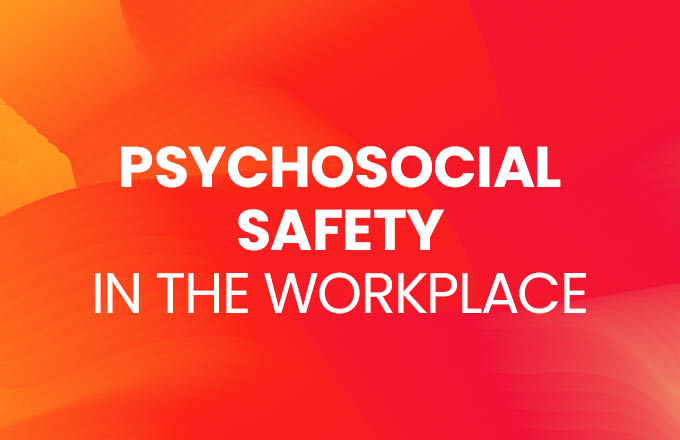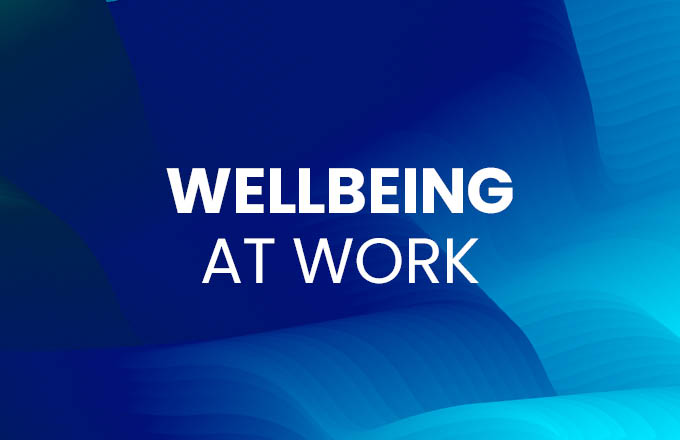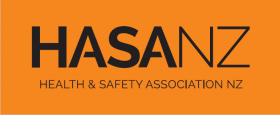
A deep dive into psychosocial safety and workplace mental wellbeing
21-22 October 2025 | Crowne Plaza, Auckland
Managing Psychosocial Risk

Psychosocial Safety in the Workplace
10 September 2025, Crowne Plaza, Auckland
Understand key concepts in psychosocial risk management: Equip yourself with the knowledge and tools to proactively manage psychosocial hazards in your workplace and cultivate a thriving workforce.

Wellbeing at Work
11 September 2025, Crowne Plaza, Auckland
Empowering the wellbeing at work: Discover innovative strategies and best practices to safeguard the mental health and wellbeing of your employees.
Ready to build a workplace where employees thrive, not just survive?
This conference gives you the knowledge and tools to manage psychosocial risks, improve mental wellbeing, and protect your business from the significant financial and reputational risks of poor workplace mental health.
Designed for business leaders, HR professionals, and anyone committed to a healthier work environment, we’ll dive deep into psychosocial risk management and psychological safety. You’ll learn key concepts, how to proactively address hazards, and how to manage risks for your business.

Here's why you can't miss it
Psychosocial Risk Management
Learn to identify, assess, and control workplace hazards and risks, and understand how to redesign work to promote wellbeing.
Building a Culture of Psychological Safety
Discover strategies for managing high-stress roles, addressing trauma, and handling issues like burnout and aggression.
Data-Driven Wellbeing Strategies
Use data to measure the impact of your wellbeing initiatives and explore real-world case studies to learn from successful strategies.
KEY SPEAKERS FOR 2025
Our 2025 lineup brings together leading advisors and thought leaders across a spectrum of sector expertise.
Check out more today.

Vanessa Cooper
Principal Advisor – Mentally Healthy Work
WorkSafe Mahi | Haumaru Aotearoa

Nathan Lee
Branch Manager – Legal and Framework Policy Branch
Safe Work Australia

Suzi McAlpine
Author of “Beyond Burnout”
Founder and Director
Suzi McAlpine Leadership,
Workshop
Move beyond theory and into action.
Add Your Heading Text Here
Sub-heading
Date or content
Sub-heading
Date or content
Sub-heading
Date or content
Sub-heading
Date or content
Sub-heading
Date or content
Venue
The location and how you can get there
Address
Crowne Plaza, Auckland
128 Albert Street, Auckland Central, Auckland 1010
Agenda
Agenda to be announced
8:50 | Registration and Coffee |
9:00 | Welcoming remarks from Conference MC John Fitzgerald, Registered (Clinical) Psychologist, Mind at Work |
9:10 | WorkSafe update: Supporting organisations to manage psychosocial risks
Vanessa Cooper, Principal Advisor Mentally Healthy Work, WorkSafe | Mahi Haumaru Aotearoa |
9:50 | Examining the Australian approach to managing psychosocial risk
Nathan Lee, Director - Legal and Framework Policy Branch, Safe Work Australia |
10:30 | Morning break |
11:00 | Understanding the legal landscape around psychosocial risk and workplace psychological safety
Catalijne Pille, Special Counsel, Anthony Harper |
11:40 | Embedding mental wellbeing and psychosocial risk as a key business risk management priority
John Fitzgerald, Registered (Clinical) Psychologist, Mind at Work |
12:20 | Lunch |
1:20 | Developing the capability for leaders to address psychosocial risk
Dr Dougal Sutherland, Principal Psychologist, Umbrella |
2:00 | Supporting the professionalisation of wellbeing in New Zealand
Terry Buckingham, Chair, Workplace Wellbeing Professionals Association and Wellbeing Lead, ASB |
2:30 | Panel discussion: Everybody’s business - coordinating the role of different teams in the management of workplace mental wellbeing and the prevention of psychosocial risk
Vanessa Matakatea, Senior Safety Manager – New Zealand, Linfox Australia and New Zealand Terry Buckingham, Chair, Workplace Wellbeing Professionals Association and Wellbeing Lead, ASB Andrew Chappell, National Manager Wellbeing, Fire and Emergency New Zealand |
3:15 | Afternoon break |
3:35 | Developing a psychosocially safe organisational culture
Vanessa Matakatea, Senior Safety Manager – New Zealand, Linfox Australia and New Zealand |
4:15 | Better Work By Design: How to design mentally-healthy work
Keri Woods, Partner, Leading Safety & Philip Voss, Partner, Leading Safety |
5:00 | Summary remarks from the Chair & networking drinks John Fitzgerald, Registered (Clinical) Psychologist, Mind at Work |
9:00 | Welcome back from Conference MC John Fitzgerald, Registered (Clinical) Psychologist, Mind at Work |
9:05 | Undertaking identification and assessment of the psychosocial risks within your organisation
Dana Carver, Principal, Scarlatti |
9:45 | Psychological safety through organisational change and transformation
Hansini Gunasekara, Founder and Principal Consultant, Upthrive Leadership |
10:30 | Morning break |
11:00 | AI technology innovation to prevent and manage psychosocial risk
Dr Tessa Bailey, Chief Executive Officer & Principal Psychologist, The Opus Centre for Psychosocial Risk and Adjunct Senior Lecturer, University of Adelaide |
11:40 | Case study: Whakapai ake – We make it better. A mixed methods approach to exploring psychosocial hazards and protective factors in Hato Hone St John
Jill Heaslip, Wellbeing and Psychological Health Advisor, Hato Hone St John | Aotearoa New Zealand |
12.20 | Lunch |
1:20 | Case study: Designing and implementing organisational controls for psychosocial risk - Fire and Emergency New Zealand
Josh Darby, Project Lead - Whanaungatanga Programme & Senior Advisor - Organisational Development, Fire and Emergency New Zealand |
2.00 | Reducing psychosocial risk by tackling workplace stress and burnout
Suzi McAlpine, Founder, Leadership Coach, Suzi McAlpine Leadership & Author, Beyond Burnout |
2:40 | Psychosocial risk management for flexible and remote work
Professor Tim Bentley, Professorial Chair in Mining Work Health and Safety & Director, MARS Centre. School of Business and Law, Edith Cowan University |
3:20 | Chair’s summary remarks and close of conference John Fitzgerald, Registered (Clinical) Psychologist, Mind at Work |
Speakers
Speakers to be announced

Andrew Chappell
Read bio

Josh Darby
Read bio

Professor Tim Bentley
Read bio

Suzi McAlpine
Read bio
Suzi is the founder and director of Suzi McAlpine Leadership. She’s a leadership developer, author, executive coach and speaker – supporting leaders and organisations throughout Australasia.
Author of the bestselling book, Beyond Burnout and the award-winning blog, The Leader’s Digest, Suzi is also the creator of The Leader’s Map, a blended leadership programme for organisations wishing to equip their emerging leaders with the necessary leadership capabilities for success. She has been featured in the Sunday Star Times, ONE News, TVNZ’s Sunday programme, Radio New Zealand, the NZ Herald and Inc. Magazine. Suzi is based in Nelson, New Zealand.
Dana Carver
Read bio

Jill Heaslip
Read bio

Dr Tessa Bailey
Read bio

Hansini Gunasekara
Read bio

Dr Philip Voss
Read bio

Keri Woods
Read bio

Vanessa Matakatea
Read bio

Terry Buckingham
Read bio
Don't miss out on the connections and credibility boost!
Live B2B events are your chance to shine. Showcase your thought leadership, solidify your market position, and forge valuable connections with potential customers – all at once.
This exclusive event puts you in front of a highly skilled audience hungry for insights. Get ready for meaningful engagement that drives results.
Plus, we have some unique opportunities to put your company, products, and services in the spotlight.
Ready to take your brand to the next level? Contact us today to learn more or secure your spot at this leading event.

Separately Bookable Workshop
Workshop for NZ operational leaders, H&S, HR, and Wellbeing Professionals
PRE-CONFERENCE ON MONDAY 20 OCTOBER
This workshop you will cover:
Psychosocial risk is increasingly recognised as a key work health and safety concern in Aotearoa New Zealand, even though it is not yet as formally regulated as in Australia. But for many professionals, the big question remains: What can we actually do about it in practice – today?
This full-day, practical workshop is designed to equip H&S, HR, and wellbeing leaders with the tools, clarity, and confidence to move from confusion to meaningful action. Whether you’re just starting out or seeking to strengthen your organisation’s approach, this session offers grounded guidance tailored to New Zealand’s regulatory and workplace landscape.
Covering:
- What you can do now: An overview of New Zealand’s current psychosocial risk obligations and opportunities under existing WHS law and WorkSafe guidance.
- Building the business case: How to engage leadership by linking psychosocial risk to performance, reputation, and regulatory risk. Learn how to quantify psychosocial risk using available data, and demonstrate return on investment (ROI) through reduced absenteeism, improved retention, and enhanced productivity.
- Real-world scenarios: Interactive case studies showcasing real-world scenarios from our audits or line manager training: reflect on root causes underpinning psychosocial hazards such as high workload or incivility, analyse how psychosocial hazards interact and what can be done to control them.
- Applying the hierarchy of controls: Learn how to identify and implement controls—beyond posters and fruit bowls—and map them to a psychosocial risk-specific hierarchy.
- Psychosocial risk management in action: What good looks like—from interviews with psychosocial risk inspectors and regulators.
You’ll Walk Away With:
- A clear understanding of what’s expected in NZ under current laws and guidance.
- The confidence and skills to put together a compelling business case for psychosocial risk management.
- Tools and frameworks to assess and control psychosocial risks.
- Real-world examples you can apply in your own context.
- A strengthened ability to engage leaders and influence change
Who Should Attend:
Operational leaders and General Managers
Health and Safety Advisors and Managers
HR and People Leaders
Wellbeing, OD, and Culture professionals
Anyone responsible for psychosocial health and safety at work

Dr. Georgi Toma
Director
Heart and Brain Works
Workshop Leader is Dr Georgi Toma, who is a leading expert in psychosocial risk and workplace mental health.
She directs Heart Brain Works, supporting organisations across Australia and New Zealand to manage psychosocial hazards and build mentally healthy workplaces.
An honorary research fellow at the University of Auckland, she studies burnout, stress, and risk factors like poor leadership and bullying. Georgi created the Psychosocial Risk Maturity Scale™ and the Wellbeing Protocol, a validated program proven to reduce burnout and improve wellbeing.
Her work combines evidence-based strategy, legal compliance, and systems thinking to embed mental health into organisational culture, leadership, and work design.
Known for her clarity, warmth, and deep subject-matter expertise, Georgi is a sought-after speaker, educator, and advisor. Her work is guided by the belief that mentally healthy work isn’t just possible – it’s essential for long-term organisational success, psychological safety, and human dignity.
TICKET OPTIONS
PRE-CONFERENCE WORKSHOP
-
Separately bookable workshop on 20 October. For valid ticket, payment by 20 October, 2025.
CONFERENCE
DOUBLE PASS
-
Must be from the same organisation & book at the same time. For valid tickets, payment by 21 October, 2025.
DOUBLE PASS
-
Must be from the same organisation & book at the same time. For valid tickets, payment by 21 October, 2025.
Registration Conditions
Ticket Terms
All prices are in New Zealand dollars ($NZD)
A surcharge of 2.5% + GST applies to credit card payments on top of the total amount.
Pre-Sale Tickets are valid only for the specific event for which they were purchased and cannot be transferred to other events. To remain valid, Super Saver and Early Bird tickets must be paid by date quoted.
Group ticket options are valid for registrations from the same organisation, booked at the same time.
By selecting any special pricing offer for classes of organisation, sector, or individuals or using any promotion code, you are asserting to the organiser your right to claim any such pricing offer, and acknowledge the organiser’s right to audit such claim and, if in the opinion of the organiser using its sole discretion the conditions for special pricing are not met, reject any registration.
For full terms & conditions, please visit https://www.brightstar.co.nz/terms-and-conditions
Make an enquiry
Got questions? Write to us.








